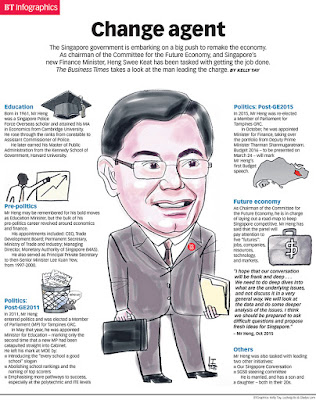By Tham Yuen-C, Assistant Political Editor, The Straits Times, 8 Dec 2015
Finance Minister Heng Swee Keat will present the Budget on March 24, just days before the close of the Government's financial year on March 31. The later-than-usual date means the Government is set to go into its new financial year without a Budget, given the parliamentary process for Budget approval.
A Finance Ministry spokesman said yesterday the delay had happened twice before - in 1997 and 2002. On both occasions, the general election was held near the time of the Budget release, which is typically in February. In 1997, it took place in January. In 2002, the polls were held in November 2001.
The process for approving the Budget starts with Parliament debating the Budget before passing the Supply Bills that control how much each ministry can spend.
The President then has to assent to the Bills before they become law. Only at the end of this process is the Government's Budget approved.
Since the process typically begins one week after the Budget statement is presented and takes about two weeks to wrap up, it will probably go beyond the April 1 start of the 2016 financial year.
But this will not have any impact on government services, said the ministry spokesman, as the Constitution provides for such situations.
Under Section 148B(4) of the Constitution, the Finance Minister, with the Cabinet's approval , can authorise spending from various government funds to keep public services running until the Supply Bills are passed into law. However, the amount that can be spent must not exceed one-quarter of the total sum approved for the particular service in the past year's Budget.
Prime Minister Lee Hsien Loong had said in September, when announcing the new Cabinet, that Budget 2016 will come later, so "we have time after the President's Address to let the messages sink in, and time for the new Minister for Finance to decide on his priorities and present his first project".
Finance Minister Heng Swee Keat will present the Budget on March 24, just days before the close of the Government's financial year on March 31. The later-than-usual date means the Government is set to go into its new financial year without a Budget, given the parliamentary process for Budget approval.
A Finance Ministry spokesman said yesterday the delay had happened twice before - in 1997 and 2002. On both occasions, the general election was held near the time of the Budget release, which is typically in February. In 1997, it took place in January. In 2002, the polls were held in November 2001.
BT INFOGRAPHIC: We take a look at new Finance Minister,Heng Swee Keat, the man tasked with charting Singapore's course into the future.
Posted by The Business Times on Tuesday, December 8, 2015
The process for approving the Budget starts with Parliament debating the Budget before passing the Supply Bills that control how much each ministry can spend.
The President then has to assent to the Bills before they become law. Only at the end of this process is the Government's Budget approved.
Since the process typically begins one week after the Budget statement is presented and takes about two weeks to wrap up, it will probably go beyond the April 1 start of the 2016 financial year.
But this will not have any impact on government services, said the ministry spokesman, as the Constitution provides for such situations.
Under Section 148B(4) of the Constitution, the Finance Minister, with the Cabinet's approval , can authorise spending from various government funds to keep public services running until the Supply Bills are passed into law. However, the amount that can be spent must not exceed one-quarter of the total sum approved for the particular service in the past year's Budget.
Prime Minister Lee Hsien Loong had said in September, when announcing the new Cabinet, that Budget 2016 will come later, so "we have time after the President's Address to let the messages sink in, and time for the new Minister for Finance to decide on his priorities and present his first project".
The 13th Parliament opens on Jan 15 with President Tony Tan Keng Yam's Address, which will set out the Government's priorities, policies and programmes for its new term, after the Sept 11 polls.
Said Mr Liang Eng Hwa, chairman of the Government Parliamentary Committee for Finance: "Parliament opens on Jan 15 and we will debate the President's Address. If the Budget comes in February, we would have two major debates with only a couple of weeks apart."
There may not be "enough time for the Government to take in the good suggestions or ideas coming out from the (first) debate".
#SGBudget2016 How can we build a better Singapore together?We took to the streets and interviewed some Singaporeans...
Posted by Ministry of Finance (Singapore) on Monday, February 1, 2016
Said Mr Liang Eng Hwa, chairman of the Government Parliamentary Committee for Finance: "Parliament opens on Jan 15 and we will debate the President's Address. If the Budget comes in February, we would have two major debates with only a couple of weeks apart."
There may not be "enough time for the Government to take in the good suggestions or ideas coming out from the (first) debate".
Analysts expect economic growth and generating jobs to be key themes of the new Budget, as Singapore moves into a period of increased social spending amid slow growth in a tepid global economy.
The delivery of the Budget statement will be covered live on TV, radio and a webcast on the ministry's Singapore Budget website.
Do you know who is Singapore's longest-serving finance minister? And who had to be persuaded by 3 Cabinet Ministers to...
Posted by The Straits Times on Monday, March 7, 2016

No comments:
Post a Comment